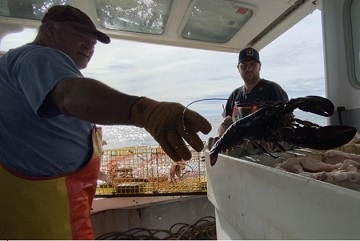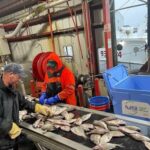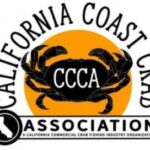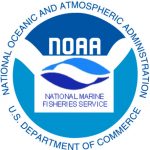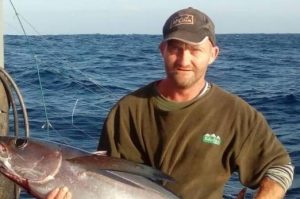Tag Archives: New England fishermen
Maine lobstermen will not be scapegoated over right whale
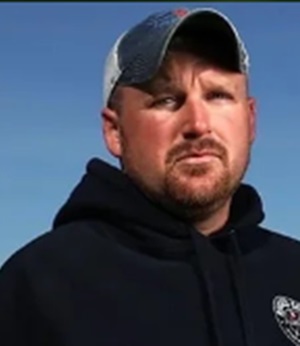 New England fishermen are bracing themselves for another salvo of regulation and activist pressure after the tragic entanglement death of a right whale that washed ashore on Martha’s Vineyard. While the future of our fisheries is uncertain, 2023 showed how much resilience and determination there is in our maritime communities. My organization – the New England Fishermen’s Stewardship Association – and our many partners are prepared to ward off any attempt to scapegoat Maine lobstermen for the declining population of the majestic right whale. Regulators and out-of-state agitators are together impugning one of the most sustainable fisheries in the world for right whale deaths. Their claims are baseless and contradicted by their own data. As agencies and NGOs ponder next steps, they might consider the fighting spirit this last year has showcased among fishermen. more, >>click to read<< by Dustin Delano 12:06
New England fishermen are bracing themselves for another salvo of regulation and activist pressure after the tragic entanglement death of a right whale that washed ashore on Martha’s Vineyard. While the future of our fisheries is uncertain, 2023 showed how much resilience and determination there is in our maritime communities. My organization – the New England Fishermen’s Stewardship Association – and our many partners are prepared to ward off any attempt to scapegoat Maine lobstermen for the declining population of the majestic right whale. Regulators and out-of-state agitators are together impugning one of the most sustainable fisheries in the world for right whale deaths. Their claims are baseless and contradicted by their own data. As agencies and NGOs ponder next steps, they might consider the fighting spirit this last year has showcased among fishermen. more, >>click to read<< by Dustin Delano 12:06
Fishermen slam Biden admin’s offshore wind push as threat to jobs, sea life
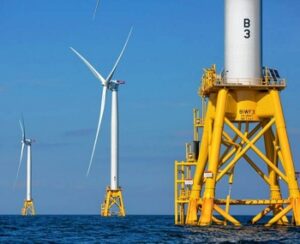 The New England Fishermen’s Stewardship Association (NEFSA) on Monday released an Offshore Wind Research Summary, a compilation of scholarly articles that identify dangers offshore wind farms pose to ocean ecosystems. “We cannot industrialize the Gulf of Maine until we understand how the wind industry interacts with the fisheries that wild harvesters have stewarded responsibly for decades,” said Jerry Leeman, NEFSA CEO and a longtime commercial fishing captain. Leeman says that the government’s attempt to justify wind farms leans on “voodoo science” because the proper methods and sufficient amount of time have not been applied. “The problem is the science that wraps around the science, the whole purpose for it is misinterpreted to the public through the fact that they think they’re getting real, accurate science,” Leeman said. >click to read<
The New England Fishermen’s Stewardship Association (NEFSA) on Monday released an Offshore Wind Research Summary, a compilation of scholarly articles that identify dangers offshore wind farms pose to ocean ecosystems. “We cannot industrialize the Gulf of Maine until we understand how the wind industry interacts with the fisheries that wild harvesters have stewarded responsibly for decades,” said Jerry Leeman, NEFSA CEO and a longtime commercial fishing captain. Leeman says that the government’s attempt to justify wind farms leans on “voodoo science” because the proper methods and sufficient amount of time have not been applied. “The problem is the science that wraps around the science, the whole purpose for it is misinterpreted to the public through the fact that they think they’re getting real, accurate science,” Leeman said. >click to read<
Fishermen’s Alliance Highlights Offshore Wind Threat to Haddock, Lobster Fisheries in Gulf of Maine
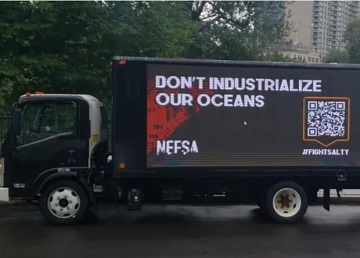 An alliance of groups representing New England’s fishermen is highlighting scientific research that suggests offshore wind development could have “population-scale effects” on key fish and crustacean species in the Gulf of Maine, including electromagnetism-induced deformities in lobsters. The New England Fishermen’s Stewardship Association (NEFSA) on Monday released an “Offshore Wind Research Summary” summarizing the existing scientific research on the environmental impact of offshore wind power development. The scientific evidence, they believe, shows that offshore wind development would have unpredictable and potentially harmful consequences for key marine species, such as lobster and haddock. >click to read< 17:37
An alliance of groups representing New England’s fishermen is highlighting scientific research that suggests offshore wind development could have “population-scale effects” on key fish and crustacean species in the Gulf of Maine, including electromagnetism-induced deformities in lobsters. The New England Fishermen’s Stewardship Association (NEFSA) on Monday released an “Offshore Wind Research Summary” summarizing the existing scientific research on the environmental impact of offshore wind power development. The scientific evidence, they believe, shows that offshore wind development would have unpredictable and potentially harmful consequences for key marine species, such as lobster and haddock. >click to read< 17:37
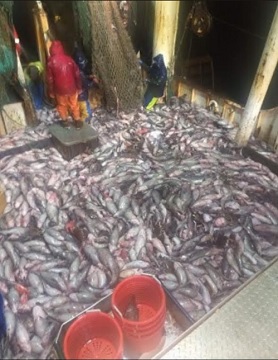
Jerry Leeman: 350 years of experience
15 captains showed up today in Gloucester, Mass., and their total experience together was over 350 years of knowledge. We discussed the white hake issue. They say the biomass isn’t the problem they’re just not seeing small hake. Well, fishermen don’t see small white hake very often due to us using 6.5″ diamond cod ends. The fish are small and slimy they slide right out the meshes. Hell, a medium pollock can swim out the mesh’s and they are twice to three times the size of small hake. Besides the point is a regulatory community that has never asked anyone in the room anything about fishing, have never asked what we were seeing, nor our thoughts about any species. Please >click to read the rest here< 10:27

Fishery regulators will discuss possible rise in minimum lobster size
Fishing regulators will gather in Virginia next week to talk about the potential of raising the minimum size lobsters need to be in order to be harvested by New England fishermen. The Atlantic State Marine Fisheries Commission’s lobster management board is meeting on Tuesday to discuss the implications of a proposal that would install new minimum size limits and other regulations for the crustaceans, either gradually over time or triggered by lobster populations dipping below a certain level. The proposal was drafted to protect the lobster population as surveys show indications of potential future decline. The idea has rankled many Maine lobstermen,,, >click to read< 09:25
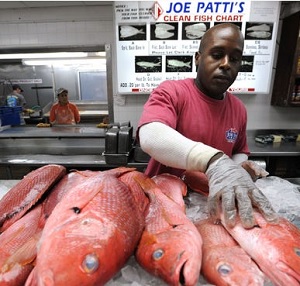
Enjoying seafood is a Pensacola tradition, but how did it begin?
Since harvesting creatures with fins and shells has long been with us it may make a bit of sense to periodically look at some highlights, ventures that seemingly evade the printed pages. One such story made local news print in the 1840s. It was in that decade that a number of venturesome fishermen out of New England believed that they had overcome one of their seasonal problems. Wintertime angling in the stormy Atlantic was hazardous, and often bitter cold, thus a few crews began to experiment, trading information they’d received about how plentiful snapper and grouper were in the Gulf. >click to read< 11:47
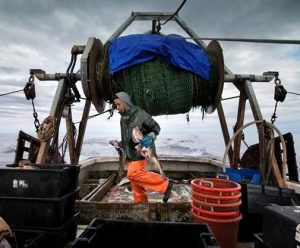
US fishermen lose quota in new fishing pact with Canada
American fishermen are losing thousands of pounds of valuable fishing quota under a new catch share agreement with Canada. Fishermen from the U.S. and Canada seek haddock, cod and flounder on Georges Bank, which is a critical fishing ground east of New England, The two countries craft a catch share agreement every year. Under the latest agreement, the U.S.’s eastern Georges Bank cod quota is falling by more than 25 per cent to about 415,000 pounds and the eastern Georges Bank haddock quota is falling by about 4 per cent to about 33 million pounds. The loss in quota will present a hardship for New England fishermen, who are already coping with low cod quotas and the collapse of the cod stock, said Terry Alexander,,, >click to read<16:40
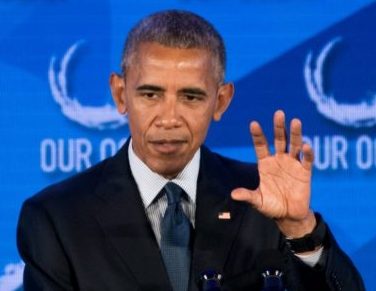
Some New England Fishermen Consider A Fight Over Obama’s Monument. This Is Why They Should.
When the concept of the National Marine Monument arose, it was a surprise to many people, and the notion of it becoming reality seemed far fetched. This week we learned it was reality, and it was a stinging slap in the face. Rep Rob Bishop R-Utah tipped us of with an article titled, “Obama will leave his legacy at the expense of fishermen”, Sept, 14th, on the eve of the State Departments “Our Oceans” conference in Washington, DC. The confirmation the following day was bitter for many. There have been hundreds of articles written in the aftermath from the enviro friendly, to the revelations of the many fishermen that will be affected, including some that say the industry will consider a legal challenge, and challenge that designation they should! Meghan Lapp the Fisheries Liaison for Seafreeze Ltd. and is active in the process of fishery management, wrote an article that appeared in the Massachusetts Lobsterman’s Association Newsletter pre announcement of the designation. As with all good fishery articles, it is timeless and important to be seen by as many fishermen and the general public after the fact, because it lays out the basis as to why this should be a call to action to reverse this Obama Antiquities Act overreach that, quite possibly, may not be legal at all. Click here to read the article with a number of links at the bottom of the page. 17:58
1943: Grizzled New England fishermen unload their catch in lower Manhattan
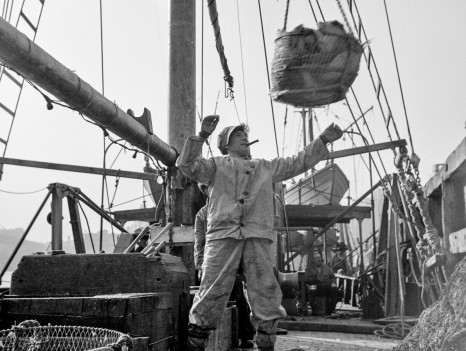 Opened in 1822, the Fulton Fish Market in lower Manhattan was for decades one of the largest markets in the United States, a nexus of commerce both for large seafood wholesalers and people looking to pick up something for dinner. Here, Office of War Information photographer Gordon Parks documents the path of a fresh catch from the boats of New England fishermen to the vendors’ stands. View the photo’s here 10:13
Opened in 1822, the Fulton Fish Market in lower Manhattan was for decades one of the largest markets in the United States, a nexus of commerce both for large seafood wholesalers and people looking to pick up something for dinner. Here, Office of War Information photographer Gordon Parks documents the path of a fresh catch from the boats of New England fishermen to the vendors’ stands. View the photo’s here 10:13
New England Fishermen face devastating cod cuts
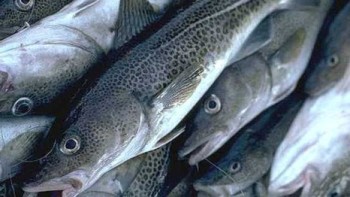 New Bedford’s commercial fishing industry — battered by last month’s arrest of magnate Carlos Rafael on federal conspiracy charges, last week’s drug raids on the waterfront and ongoing monitoring costs — took another punch to the gut this week, as government regulators proposed new cuts to cod catches that could take effect May 1. “Those cuts will be devastating to the groundfishing fleet of New Bedford, and the whole New England coast,” said John Haran, manager of groundfish Sector 13. The National Oceanic and Atmospheric Administration (NOAA), in conjunction with the New England Fishery Management Council, released a proposed update Monday to the federal management plan for the northeastern fishery. Read the rest here 20:45
New Bedford’s commercial fishing industry — battered by last month’s arrest of magnate Carlos Rafael on federal conspiracy charges, last week’s drug raids on the waterfront and ongoing monitoring costs — took another punch to the gut this week, as government regulators proposed new cuts to cod catches that could take effect May 1. “Those cuts will be devastating to the groundfishing fleet of New Bedford, and the whole New England coast,” said John Haran, manager of groundfish Sector 13. The National Oceanic and Atmospheric Administration (NOAA), in conjunction with the New England Fishery Management Council, released a proposed update Monday to the federal management plan for the northeastern fishery. Read the rest here 20:45
New England fishermen fear looming costs for at-sea monitors
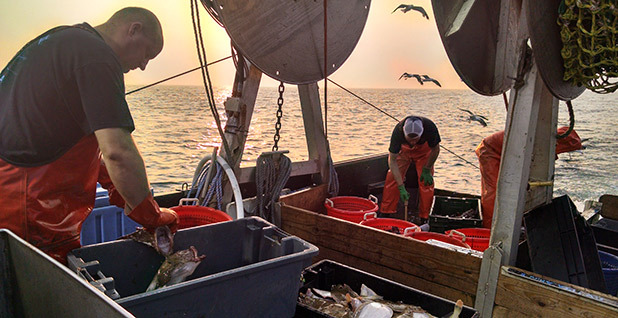 New England fishermen, running out of time before the federal government hands them the cost of monitoring the industry at sea, say emergency intervention is needed or many of them will be out of business. Several New England congressmen said they are looking for ways to reduce the burden for fishermen. U.S. Sen. Kelly Ayotte, a New Hampshire Republican, has submitted a bill to terminate the independent, third-party monitoring program unless it is fully funded by NOAA. She and., requested an investigation of the monitoring program,,, Read the rest here 08:02
New England fishermen, running out of time before the federal government hands them the cost of monitoring the industry at sea, say emergency intervention is needed or many of them will be out of business. Several New England congressmen said they are looking for ways to reduce the burden for fishermen. U.S. Sen. Kelly Ayotte, a New Hampshire Republican, has submitted a bill to terminate the independent, third-party monitoring program unless it is fully funded by NOAA. She and., requested an investigation of the monitoring program,,, Read the rest here 08:02
Roger Berkowitz, Legal Sea Foods CEO talk’s about the new restrictions on New England fishermen – Video
 In addition, Berkowitz also weighs in on everything from global warming and impact on fish stock to traffic in the innovation district. more@necn 11:36
In addition, Berkowitz also weighs in on everything from global warming and impact on fish stock to traffic in the innovation district. more@necn 11:36
Salt of the Sea screens for students at Murie Science Building, University of Alaska Fairbanks
The screening of the movie 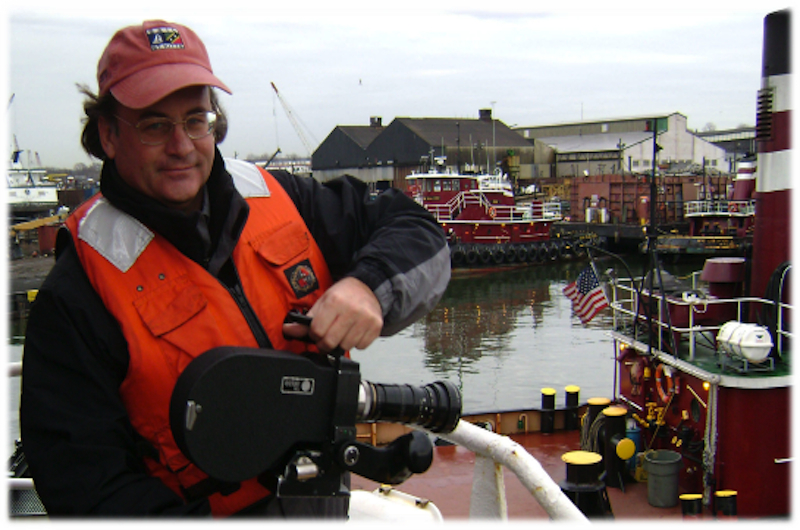 was produced and directed by filmmaker Tom Garber. “Salt of the Sea” is a story about what it takes to be a fisherman out in the open seas of New England and how governmental policies, economics and courage pushed fishermen to their limits and beyond. more@uafsunstar 23:57
was produced and directed by filmmaker Tom Garber. “Salt of the Sea” is a story about what it takes to be a fisherman out in the open seas of New England and how governmental policies, economics and courage pushed fishermen to their limits and beyond. more@uafsunstar 23:57
Mass. delegation calling SBA loans aid for the New England fishing industry.
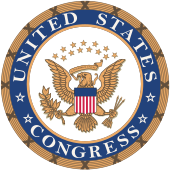 The entire Massachusetts Congressional delegation has asked the U.S. Small Business Administration to provide financial assistance to New England fishermen who have been affected by reductions in annual catch limits and groundfish stocks. The Commerce Department last fall issued a declaration of disaster for the Northeast groundfish fishery, saying that it could require $100 million in federal aid. more@capecodonline 08:27
The entire Massachusetts Congressional delegation has asked the U.S. Small Business Administration to provide financial assistance to New England fishermen who have been affected by reductions in annual catch limits and groundfish stocks. The Commerce Department last fall issued a declaration of disaster for the Northeast groundfish fishery, saying that it could require $100 million in federal aid. more@capecodonline 08:27
Lawmakers join push for SBA fish aid – Gloucester Daily Times 13:50
New England Fishermen – Stellwagen Bank National Marine Sanctuary seeks advisory council applicants
 The sanctuary is accepting applications for the following seats: Research, two primary members; conservation, primary member; education, alternate; marine transportation, primary member and alternate; recreational fishing, primary member and alternate; mobile gear commercial fishing, primary member; business industry, alternate; at-large, primary member and alternate; and youth, primary member and alternate. more@wickedlocal 09:31
The sanctuary is accepting applications for the following seats: Research, two primary members; conservation, primary member; education, alternate; marine transportation, primary member and alternate; recreational fishing, primary member and alternate; mobile gear commercial fishing, primary member; business industry, alternate; at-large, primary member and alternate; and youth, primary member and alternate. more@wickedlocal 09:31
Senator Warren Discusses Relief for Fishermen in FY14 Senate Appropriations Bill with Bob Vanasse
![]()
 Executive Director Bob Vanasse interviewed Massachusetts Senator Elizabeth Warren on efforts to bring relief to New England fishermen through provisions in the FY14 Senate Appropriations bill.
Executive Director Bob Vanasse interviewed Massachusetts Senator Elizabeth Warren on efforts to bring relief to New England fishermen through provisions in the FY14 Senate Appropriations bill.
Fisherman Survival, Perverted ENGO Logic, and another NOAA/NMFS Fumble. Plan to reopen New England fishing spots debated
BOSTON (AP) – A plan to allow certain New England fishermen back into fishing grounds where they’ve long been banned was so objectionable to environmentalists that two groups sued to kill it months before it was officially released. And after the proposal was unveiled last week, fishermen who once backed the idea called the plan a useless gesture that does nothing for their struggling industry. None of the criticism surprises the Northeast’s top fishing regulator, John Bullard. But he says it doesn’t mean the proposal to reopen 3,000 square miles of Atlantic Ocean can’t work. “We recognize it’s probably not going to make anyone happy,” Bullard said. But, he added, “We think it’s a responsible way to make abundant stocks accessible to people.” continued@myfoxboston
Status quo tightens squeeze on fishermen
![]() Just six weeks into the new fishing year, Gloucester and other New England fishermen and their federal regulators share a common belief that the very existence of the fishery is in peril, yet both sides remain entrenched in their feelings regarding how to deal with the crisis the federal Department of Commerce acknowledges is an “economic disaster.” continued @ Gloucester Daily Times
Just six weeks into the new fishing year, Gloucester and other New England fishermen and their federal regulators share a common belief that the very existence of the fishery is in peril, yet both sides remain entrenched in their feelings regarding how to deal with the crisis the federal Department of Commerce acknowledges is an “economic disaster.” continued @ Gloucester Daily Times
Push for aid for fishery intensifies as budget process begins
![]() WASHINGTON — Less than three months after an effort to provide a pool of aid to distressed fisheries across the nation died at the end of the last Congress, efforts to secure disaster relief funding for New England fishermen are heating up on Capitol Hill. continue reading
WASHINGTON — Less than three months after an effort to provide a pool of aid to distressed fisheries across the nation died at the end of the last Congress, efforts to secure disaster relief funding for New England fishermen are heating up on Capitol Hill. continue reading
OUR OPINION: NOAA succeeds only in making fishermen extinct
 Simply put, New England fishermen will likely be extinct by 2014. Years of unfunded, unscientific and punitive laws handed down by the National Oceanic and Atmospheric Administration have cast fishermen adrift in a sea of regulations designed to drown them. Ostensibly, NOAA’s goal was to protect cod and other groundfish from extinction, yet none of its measures have worked. Read more
Simply put, New England fishermen will likely be extinct by 2014. Years of unfunded, unscientific and punitive laws handed down by the National Oceanic and Atmospheric Administration have cast fishermen adrift in a sea of regulations designed to drown them. Ostensibly, NOAA’s goal was to protect cod and other groundfish from extinction, yet none of its measures have worked. Read more
John Bullard, enemy of porpoises?- or Is Carl Safina just a winey Enviro Wench?!
Bullard just gave those fishermen a free pass to ignore the law for another four months,” fumed Carl Safina of the Blue Ocean Institute in a sizzling commentary titled “As Fisheries Service Dithers, New England Porpoises Drown.” And Sufina is willing to sacrifice the remainder of New England fishermen. John Bullard upheld National Standard 8. Finally someone has the balls to do things right, and Safina the winey bitch is drooling with mad contempt while co-author Andrew Read, professor of marine biology at Duke University pouts with him. I think it’s time to land these porpoises, and process them for people to eat. I’m willing to eat it instead of wasting it. They like all other Marine Mammals are experiencing a population explosion thanks to the success of MMPA, a law pushed by environs and others in 1972 with no consideration of consequence. That being huge numbers of marine mammals! Bon Appetit!
November 02, 2012 12:00 AM, Steve Urbon-Three months into his tenure as the Northeast regional administrator of the National Marine Fisheries Service, former New Bedford mayor John K. Bullard is being called a heartless porpoise killer and a pushover, or worse, for the fishing industry. And it’s not just anyone doing the accusing. It is a pair of prominent marine scientists, one of whom Bullard says he considers a friend from his earlier days at the National Oceanic and Atmospheric Administration. http://www.southcoasttoday.com/apps/pbcs.dll/article?AID=/20121102/NEWS/211020324






